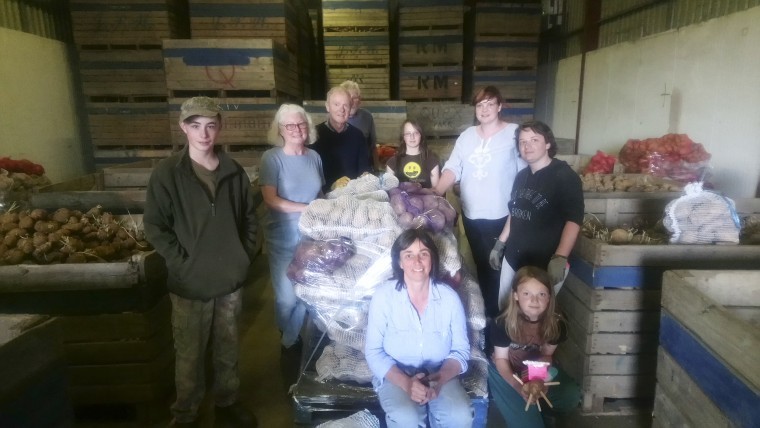“There has been an increase in supplies and yields,” said Mr Philpott, who grows 80 acres of potatoes for his farm shop and the wholesale trade. “An increase in the acreage last year has led to over supply. But demand has dropped, so there have been increases and decreases at the wrong end of the scales.”
He cannot remember a year when he has had to throw away so many good quality potatoes without being able to sell them. At the end of May, he offered up to 100 tonnes of stored potatoes to the Kent hub of the Gleaning Network, which collects waste food from farms and gives it to those in need. Mr Philpott’s father knew Tristram Stuart who set up Feedback, a charity which includes the Gleaning Network: the gleaners have been to the farm before, but this was their biggest glean to date. “They are a very good organisation, “ said Mr Philpott. “They arrange transport and get the produce to the right place at the right time.”
The gleaners managed to grade and bag about 30 tonnes of potatoes. But Mr Philpott has given away another 60 tonnes to a contractor he knows for cattle feed. “I still have potatoes from last year’s crop which will have to be thrown away.” In November, he was selling potatoes wholesale for between £100 and £120 a tonne. After that, the trade deteriorated rapidly, and Mr Philpott has not sold any since January. “The lowest I got was £80 a tonne. Below that, it is not worth doing because of the grading and transport costs.” In a good year, Mr Philpott could be paid £200 a tonne before grading.
Of the 80 acres he grows, some are first earlies and second earlies, with 35 acres down to main crop which go into store. Half of the acreage go to Mr Philpott’s farm shop – where the trade has been better – and half as ware potatoes to wholesale markets. “I starterd digging earlies a month ago this year,” Mr Philpott said. “I have reduced the acreage and have a lot less early potatoes than in the past. I have early potatoes in the ground which I could have dug but the demand is not there.”
The experience has not deterred him from planting potatoes again this year at the end of February, through March and into April. “This year, everyone was a bit late to plant because of the weather. People may have cut back after last year, and I don’t think yields will be as high as they have been in the past.”
Other growers have been hit by the over supply of potatoes. Trevor Bradley – who farms 550 acres of vegetables and arable crops at Boundary Farm, Wingham in Kent with his brother Stephen – agreed that it had been the worst year he could remember for potatoes. “2017 was a very good year for planting and there was a wonderful harvest,” said Mr Bradley. “That produced a lot of extra yield, but there has been a big reduction in demand.” On some ground, the Bradleys produced 30 tonnes an acre, compared to the more usual 20 tonnes.
Last summer, the Bradleys moved 2,500 tonnes of potatoes off the land up to November. They stored 1,800 tonnes and have about 100 tonnes left. “We are 500 tonnes over budget, and we have dumped a few,” said Mr Bradley. The Bradleys don’t supply supermarkets, but do supply fish and chip shops, caterers, big farm shops, the wholesale market and other outlets.
Like the Bradleys, Mr Philpott does not just depend on potatoes for his income. His main crop is 250 acres of cauliflowers, grown on light chalky soils which escape the frosts that can happen elsewhere. Cutting started at the end of October and finished in early June, with just two days lost because of the snow.




